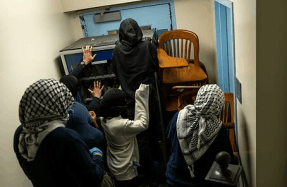As Trump Pushes Theory Of Virus Origins, Some See Parallels In Lead-Up To Iraq War

Over the past week, President Trump and his team have repeatedly claimed to have intelligence showing that the new coronavirus accidentally escaped from a lab in China.
But an official statement from America's intelligence chief says there's not yet conclusive evidence for that theory. Outside scientists, meanwhile, say that the chances of a lab accident are very small, while the odds of a natural infection are high.
Some former intelligence officials and independent analysts now say that the disconnect echoes missteps that led to the 2003 invasion of Iraq. While the circumstances are different, the analysts warn that the administration's continued pursuit of the lab theory could signal an unhealthy relationship between top administration officials and the agencies tasked
You’re reading a preview, subscribe to read more.
Start your free 30 days





